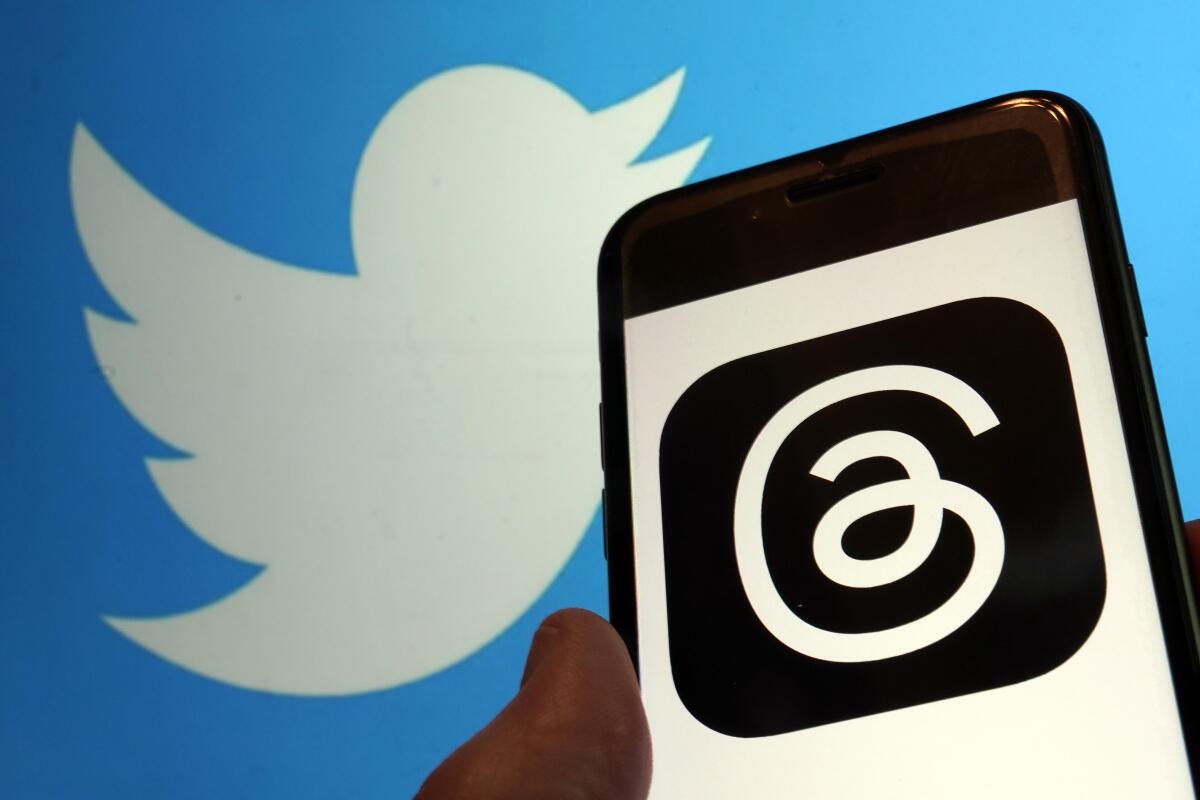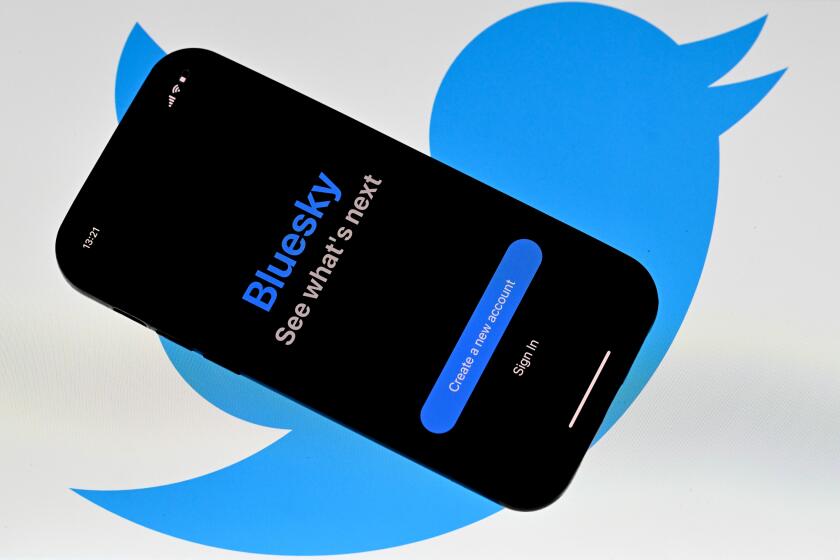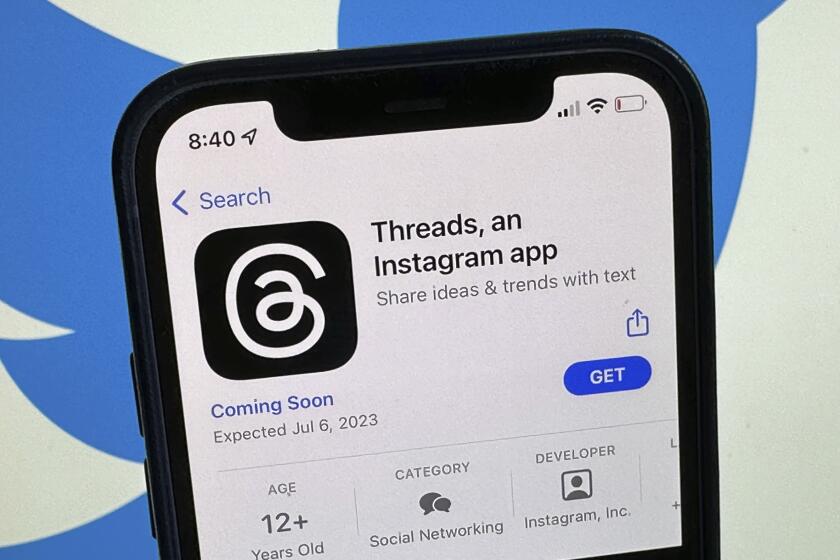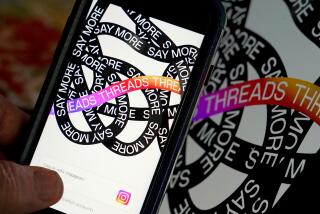Opinion: Elon Musk accidentally ruined Twitter. He did us all a huge favor

- Share via
Mark Zuckerberg released Meta’s Twitter clone Threads last week, with more than 100 million users reportedly signing up within the first seven days. Meta’s opportunity was generated in large part because Twitter is collapsing after spectacularly bad decisions made by its owner, Elon Musk.
But instead of criticizing Musk for his poor business choices, we should praise him. By making it increasingly difficult to be on Twitter the way its users had enjoyed, he has generated a golden opportunity for millions of people to partially free themselves from a terrible addiction to social media.
Close to 20% of Americans use Twitter and can rid themselves of this time thief. We can finally reduce our need for that small dopamine hit that came from the platform. We should take Twitter’s collapse as an accidental gift from Musk and not replace it with yet another social media platform.
When it comes to Zuckerberg versus Musk, I hope they both lose. But a quieter corner of the virtual commons? I’m in.
We’re all increasingly online. In 2010 only 11% of Americans ages 65 and older were on social media; now 45% of this age group are, according to Pew Research polling. A dozen years ago, roughly one-third of people between the ages of 50 and 64 had a social media account; now it’s three-quarters. And about half of Americans ages 18 to 29 say they are “almost constantly online.”
Indeed, in the pre-Musk era, 66% of Twitter users indicated they visited the platform at least once a week. They did this even though the overwhelming majority of users said they encountered inaccurate or misleading information on the site, with a third of them saying there was “a lot” of this sort of content. And 26% of people said it increased their stress levels.
Scientific studies suggest this pattern of addictive behavior has rewired our brains over the years. Internet addiction is recognized as a phenomenon “characterized by excessive or obsessive online and offline computer use that leads to distress and impairment” by the American Psychological Assn. For kids and teenagers, it’s even worse. Research shows that there are negative consequences in the brain development of adolescents who check social media regularly.
But by making Twitter less useful and less fun, Musk is forcing us to reduce our dependence upon his product. It’s as if he was in the cigarette business and suddenly rationed our access to one-third of a cigarette each day (unless you paid extra for a pack emblazoned with a blue checkmark, of course.)
Now, addicts are faced with two choices. Option A: Switch to a similar cigarette company such as Threads, Mastodon, BlueSky or even Truth Social (which leaves a terrible taste in your mouth). Or option B: Drastically reduce smoking.
Consider Option B.
Certainly, there are downsides to consciously uncoupling from a 24/7 short-content service. Twitter really could be a great tool for investigations and news monitoring. I first learned about COVID-19 toward the end of 2019 when someone tweeted that Wuhan, China — a metropolis the size of Chicago — was halting bus and train service.
There’s no desktop version or chronological feed, but users fed up with Elon Musk’s Twitter are already flocking to Threads by the millions.
And true social connections can be forged there. I have relationships with people I’ve met on Twitter who I’ve never met in real life. And I’ve met people in real life after first connecting with them on the platform. I even got a job once via a contact I met on Twitter.
Then again, I also have friends who were hounded off the platform and had to go into in-real-life hiding. I’ve been harassed there by Islamic State fanboys, Hezbollah groupies, antisemites and assorted right-wing personalities. Being a woman on Twitter generally seems awful. So, it’s a bit of a mixed bag.
Still, I haven’t quit Twitter. But I haven’t joined Threads or any of the other alternatives either. And my phone indicates that my screen usage has fallen dramatically since Musk announced this month that nonpaying users would have more restrictions on how much they would see on the platform.
Let’s be honest: Those who like Twitter will probably still check it occasionally. We may not have kicked the habit completely, but by fundamentally spoiling his product Musk is setting us squarely on the road to recovery.
Aki Peritz is a former CIA analyst and the author of “Disruption: Inside the Largest Counterterrorism Investigation in History.”
More to Read
A cure for the common opinion
Get thought-provoking perspectives with our weekly newsletter.
You may occasionally receive promotional content from the Los Angeles Times.












